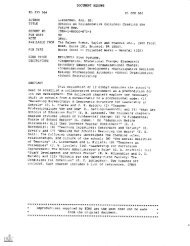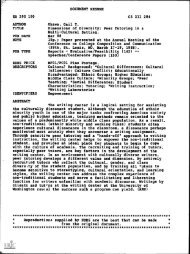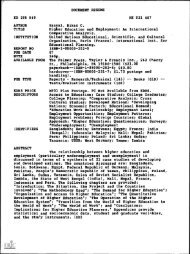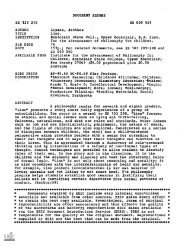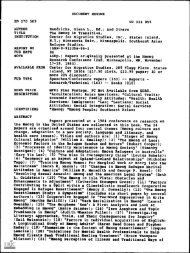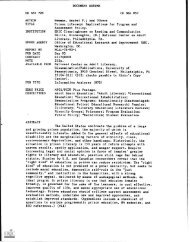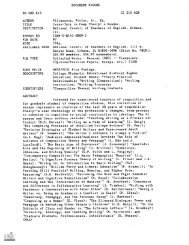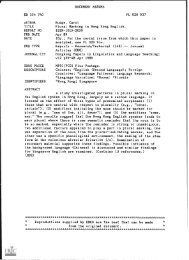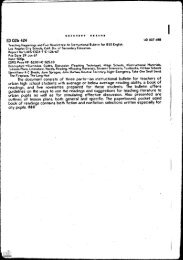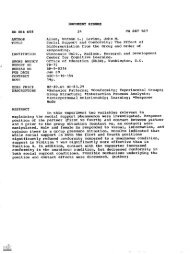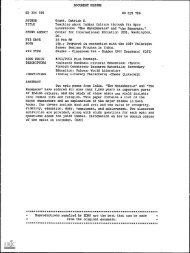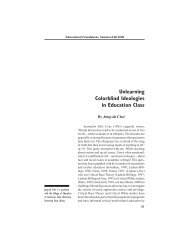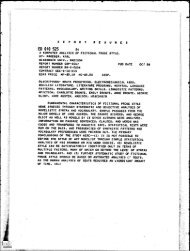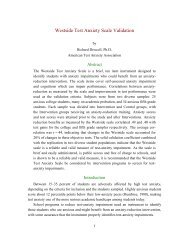- Page 1 and 2: DOCUMENT RESUMEED 366 967AUT7ORTITL
- Page 3 and 4: Colors of a Different Horse3
- Page 5 and 6: Colors of a Different HorseRethinki
- Page 7 and 8: ContentsAcknowledgmentsPermissionsI
- Page 9 and 10: Contentsvii20. The MFA Graduate as
- Page 11 and 12: AcknowledgmentsixMyers, John Pe lz,
- Page 13 and 14: Introduction: Of Radishes andShadow
- Page 15 and 16: Of Radishes and Shadows, Theory and
- Page 17 and 18: Of Radishes and Shadows, Theory and
- Page 19 and 20: Of Radishes and Shadows, Theory and
- Page 21: Of Radishes and Shadows, Theory and
- Page 25 and 26: Of Radishes and Shadows, Theory and
- Page 27 and 28: 1. The Workshop and ItsDiscontentsF
- Page 29 and 30: The Workshop and Its Discontents 5f
- Page 31 and 32: The Workshop and Its Discontents 7G
- Page 33 and 34: Reflections on the Teaching of Crea
- Page 35 and 36: Reections on the Teaching of Creati
- Page 37 and 38: Reflections on the Teaching of Crea
- Page 39 and 40: Reflections on the Teaching of Crea
- Page 41 and 42: Reflections on the Teaching of Crea
- Page 43 and 44: Reflections on the Teaching of Crea
- Page 45 and 46: Reflections on the Teaching of Crea
- Page 47 and 48: Reflections on the Teaching of Crea
- Page 49 and 50: Reflections on the Teaching of Crea
- Page 51 and 52: 3 The Body of My Work Is NotJust a
- Page 53 and 54: The Body of My Work Is Not Just a M
- Page 55 and 56: The Body of My librk Is Not Just a
- Page 57 and 58: The Body of My Work Is Not Just a M
- Page 59 and 60: 4 Life in the Trenches:Perspectives
- Page 61 and 62: Life in the Trenches: Perspectives
- Page 63 and 64: Life in the Trenches: Perspectives
- Page 65 and 66: Life in the Trenches: Perspectives
- Page 67 and 68: Life in the Trenches: Perspectives
- Page 69 and 70: Li le in the Trenches: Perspectives
- Page 71 and 72: Life in the Trenches: Perspectives
- Page 73 and 74:
Life in the Trenches: Perspectives
- Page 75 and 76:
Life in the Trenches: Perspectives
- Page 77 and 78:
Life in the Trenches: Perspectives
- Page 79 and 80:
5 Theory Creative Writing, andthe I
- Page 81 and 82:
Theory, Creative Writing, and the I
- Page 83 and 84:
Theori: Creative 14 Wang, and the I
- Page 85 and 86:
Theory. Creative R'riting, and the
- Page 87 and 88:
Theory Creative 14.rriting, and the
- Page 89 and 90:
Theory, Creative Writing, and the I
- Page 91 and 92:
Theorj; Creative Writing, and the I
- Page 93 and 94:
Theory Creative 14'riting, and the
- Page 95 and 96:
Theory, Creative Writing, and the I
- Page 97 and 98:
Theory, Cr_ative Writing, and the I
- Page 99 and 100:
,6 Teaching Creative Writing if the
- Page 101 and 102:
Teaching Creative Writing if the Sh
- Page 103 and 104:
Teaching Creative Writing if the Sh
- Page 105 and 106:
Teaching Creative Writing if the Sh
- Page 107 and 108:
Teaching Creative Writing if the Sh
- Page 109 and 110:
Teaching Creative Writing if the Sh
- Page 111 and 112:
Teaching Creative Writing if the Sh
- Page 113 and 114:
Teaching Creative Writing if the Sh
- Page 115 and 116:
Teaching Creative Writing if the Sh
- Page 117 and 118:
Teaching Creative Writing if the Sh
- Page 119 and 120:
Teaching Creative Writing if the Sh
- Page 121 and 122:
Teaching Creative Writing if the Sh
- Page 123 and 124:
Pedagogy in Penumbra: Teaching, Wri
- Page 125 and 126:
Pedagogy in Penumbra: Teaching, Wri
- Page 127 and 128:
Pedagogy in Penumbra: Teaching, Wri
- Page 129 and 130:
Pedagogy in Penumbra: Teaching, Wri
- Page 131 and 132:
Pedagogy in Penumbra: Teaching, Wri
- Page 133 and 134:
Pedagogy in Penumbra: Teaching, Wri
- Page 135 and 136:
Pedagogy in Penumbra: Teaching, Wri
- Page 137 and 138:
Pedagogy in Penumbra: Teaching, Wri
- Page 139 and 140:
Pedagogy in Penumbra: Teaching, Wri
- Page 141 and 142:
Pedagogy in Penumbra: Teaching, Wri
- Page 143 and 144:
Pedagogy in Penumbra: Teaching, Wri
- Page 145 and 146:
Pedagogy in Penumbra: Teaching, Wri
- Page 147 and 148:
Pedagogy in Penumbra: Teaching, Wri
- Page 149 and 150:
8 Literary Theory and the WriterJay
- Page 151 and 152:
Literary Theory and the Writer 129g
- Page 153 and 154:
III Creative Writing andPedagogy1 5
- Page 155 and 156:
134 Creative Writing and PedagogyTh
- Page 157 and 158:
136 Creative Writing and PedagogyGu
- Page 159 and 160:
138 Creative Writing and PedagogySe
- Page 161 and 162:
140 Creative Writing and Pedagogyth
- Page 163 and 164:
142 Creative Writing and PedagogyTh
- Page 165 and 166:
144 Creative Writing and PedagogyBi
- Page 167 and 168:
10 On Seeing the Green Parrotand th
- Page 169 and 170:
148 Creative Writing and PedagogyI
- Page 171 and 172:
7150 Creative Writing and Pedagogy1
- Page 173 and 174:
I 52Creative Writing and Pedagogyth
- Page 175 and 176:
154 Creative Writing and Pedagogymi
- Page 177 and 178:
156 Creative Writing and Pedagogyce
- Page 179 and 180:
11 It Is Ourselves that WeRemake: T
- Page 181 and 182:
160 Creative Writing and PedagogyTh
- Page 183 and 184:
162 Creative Writing and Pedagogyse
- Page 185 and 186:
164 Creative Hi-iting and PedagogyT
- Page 187 and 188:
166 Creative Writing and PedagogyCa
- Page 189 and 190:
168 Creative Writiag and Pedagogydi
- Page 191 and 192:
170 Creative Writing and Pedagogybe
- Page 193 and 194:
4172 Creative Writing and Pedagogy3
- Page 195 and 196:
174 Creative Writing and PedagogyTh
- Page 197 and 198:
176 Creative Writing and Pedagogy9.
- Page 199 and 200:
178 Creative Writing and Pedagogy3.
- Page 201 and 202:
13 Crossing the Lines: On CreativeC
- Page 203 and 204:
Crossing the Lines 183If creative w
- Page 205 and 206:
Crossing the Lines 185articles, rep
- Page 207 and 208:
Crossing the Lines 187set guideline
- Page 209 and 210:
Crossing the Lines 189I know a few
- Page 211 and 212:
Crossing the Lines 191rarely themse
- Page 213 and 214:
Crossing the Lines 193our own Engli
- Page 215 and 216:
Crossing the Lines 1954. See Corder
- Page 217 and 218:
Crossing the Lines 197Schwartz, Mim
- Page 219 and 220:
Risky Business/Safe Places 199they
- Page 221 and 222:
Risky Business/Safe Places 20 1writ
- Page 223 and 224:
Storytelling in the Writing Center
- Page 225 and 226:
Storytelling in the Writing Center
- Page 227 and 228:
Storytelling in the Writing Center
- Page 229 and 230:
It's Okay to Be Creative: A Role fo
- Page 231 and 232:
It's Okay to Be Creative: A Role fo
- Page 233 and 234:
It's Okay to Be Creative: A Role fo
- Page 235 and 236:
It's Okay to Be Creative: A Role fo
- Page 237 and 238:
17 Oral Literature in the Teachingo
- Page 239 and 240:
Oral Literature in the Teaching of
- Page 241 and 242:
Oral Literature in the Teaching of
- Page 243 and 244:
Oral Literature in the Teaching of
- Page 245 and 246:
18 Without a Net: CollaborativeWrit
- Page 247 and 248:
Without a Net: Collaborative Writin
- Page 249 and 250:
Without a Net: Collaborative Writin
- Page 251 and 252:
Without a Net: Collaborative Writin
- Page 253 and 254:
Without a Net: Collaborative Writin
- Page 255 and 256:
Reading the Creative Writing Course
- Page 257 and 258:
Reading the Creative Writing Course
- Page 259 and 260:
Reading the Creative Writing Course
- Page 261 and 262:
Reading the Creative Writing Course
- Page 263 and 264:
Reading the Creative Writing Course
- Page 265 and 266:
Reading the Creative Writing Course
- Page 267 and 268:
Reading the Creative Writing Course
- Page 269 and 270:
The MFA Graduate as Composition Ins
- Page 271 and 272:
The MFA Graduate as Composition Ins
- Page 273 and 274:
The MFA Graduate as Composition Ins
- Page 275 and 276:
=irV Creative Writing and the21st C
- Page 277 and 278:
258 Creative Writing and the 2Ist C
- Page 279 and 280:
260 Creative Writing and the 2Ist C
- Page 281 and 282:
262 Creative Writing and the 21st C
- Page 283 and 284:
264 Creative Writing and the 21st C
- Page 285 and 286:
22 Riding the Bus in SiliconValley:
- Page 287 and 288:
268 Creative Writing and the 2Ist C
- Page 289 and 290:
270 Creative Writing and the 21st C
- Page 291 and 292:
272 Creative Writing and the 21st C
- Page 293 and 294:
274 Creative Writing and the 21 it
- Page 295 and 296:
276 Creative Writing and the 2Ist C
- Page 297 and 298:
278 Creative Writing and the 21 st
- Page 299 and 300:
AfterwordColors of a DifferentHorse
- Page 301 and 302:
7/282 Afte,wordwith so many unrecog
- Page 303 and 304:
284 Afterwordtold us stories of his
- Page 305 and 306:
286 AfienvordAt least the two perce
- Page 307 and 308:
288 AfterwordAs Trinh Minh-ha does
- Page 309 and 310:
290 AfterwardPeter Elbow's retellin
- Page 311 and 312:
292 Afterwardby instituting pedagog
- Page 313 and 314:
294 Afterwordspite of my resistance
- Page 315 and 316:
Selected Resources for TeachingCrea
- Page 317 and 318:
298 Selected ResourcesGass, William
- Page 319 and 320:
300 Selected ResourcesPedagogySelec
- Page 321 and 322:
302 Selected ResourcesOchester, Ed,
- Page 323 and 324:
304 Selected ResourcesPreminger, Al
- Page 325 and 326:
306 Selected ResourcesTorgersen, Er
- Page 327 and 328:
308 Selected ResourcesBizzaro, Patr
- Page 329 and 330:
310 Index224, 238, 244, 280, 296, 2
- Page 331 and 332:
312 IndexDicks, Bernice, 50Dickson,
- Page 333 and 334:
314 IndexJack lin, C. N., 137, 144J
- Page 335 and 336:
316 IndexParini, Jay, 127, 302, 326
- Page 337 and 338:
318 Indexredefining apporaches to,
- Page 339 and 340:
EditorsWendy Bishop teaches writing
- Page 341 and 342:
324 Contributorswhere he serves as
- Page 343 and 344:
-326 ContributorsYork Times Literar
- Page 345 and 346:
328 ContributorsUniversity, he is a



